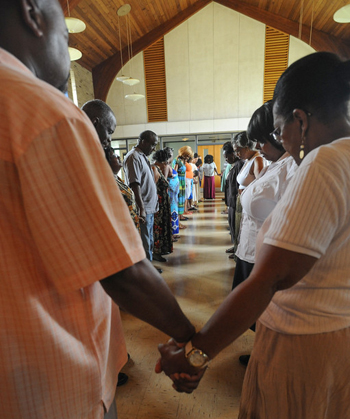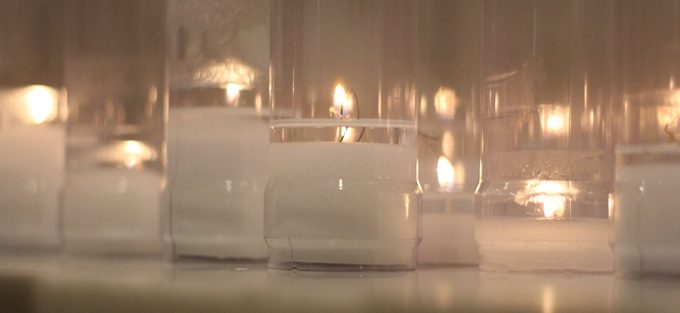by Michelle Terry
“Rejoice always, pray without ceasing, give thanks in all circumstances; for this is the will of God in Christ Jesus for you.” (1 Thessalonians 5:16-18)
I have never been accused of being a morning person. For at least the first 15 minutes after waking up, I greet the day with feelings that range from resigned acceptance to total dread. There is no particular reason, other than mornings are hard and I would rather sleep.
Which is just to say, giving thanks in all circumstances is work for me. Waking up before I am ready is a silly example, but we all know life gets much more complicated than early alarms. What about when the diagnosis is grim? Or the job opportunity is lost? The relationship is broken? How do we give thanks when we are not feeling grateful, when we cannot find anything to be thankful for at the moment?
Being told I should be thankful rarely makes it so. It reminds me, yes, but it does not increase my gratitude. Since November is a time we pause to give thanks for what we have, I started thinking—what helps me be more appreciative?
Practicing giving thanks
 The answer came to mind quickly, and somewhat surprised me: the spiritual disciplines. Spiritual disciplines are those practices that help us grow in our relationship with God. Much like we need physical exercise to stay in good health, we need spiritual exercise as well. Prayer, Scripture study, fasting, confession, service to others, silence, worship—all these and more are considered part of the spiritual disciplines. They have helped many Christians grow closer to God and bolder in faith.
The answer came to mind quickly, and somewhat surprised me: the spiritual disciplines. Spiritual disciplines are those practices that help us grow in our relationship with God. Much like we need physical exercise to stay in good health, we need spiritual exercise as well. Prayer, Scripture study, fasting, confession, service to others, silence, worship—all these and more are considered part of the spiritual disciplines. They have helped many Christians grow closer to God and bolder in faith.
I am not particularly disciplined in any area of my life, including spiritually. I admire those who wake up early and start their day with quiet and prayer. I have fasted only a few times in my life, and I do not look to repeat the experience with any regularity. While I practice many of the spiritual disciplines, I am not as intentional as I could be about them.
And yet, they have helped me become more grateful. Though I find it to be one of the periphery benefits of serving others, I cannot serve someone in need without being reminded of how much I have. Worship often leaves me thankful, particularly for the people God has placed in my life. Reading the story of God’s great love for us bolsters my appreciation for God’s grace.
Prayer of thanks
Of all of the disciplines, the one that most keeps me rooted in thankfulness is prayer. Prayer is complicated. It is not clear to me how it works, particularly when it comes to “big” requests like healing and help.
But thanksgiving prayers are not as complicated. As the author of the Book of James writes, “every perfect gift, is from above” (James 1:17). All we have to do is thank God for the good in our lives, both big and small. A miracle, a new television, forgiveness. I suspect that God is just as glad to hear our thanks and praise for the small luxuries in our lives as God is for hearing our thanks for forgiveness and healing. Either way we are recognizing God’s grace.
Even in prayer, it is easy for me to get distracted. There are so many things to do in a day, and I never think of any of them until I am conversing with my Maker. Further, when I do talk to God, I am far more likely to inundate God with a “To Do” list than to give thanks. (I have frequent suggestions for how God might run the world or at least my little corner of it. God is very patient.)
That is why the discovery of prayer tools was such a gift for me. My mind needs focus, and prayer tools help. Until I led a Bible study about prayer tools, I had no idea how many options existed. Some people prefer lists or journals, others using Scripture as a prayer tool, still others walk the labyrinth. Those are all good and beneficial practices, but right now my favorite prayer tool is prayer beads. Protestant prayer beads are a fairly recent development, and they have been an absolute gift to me.
Prayer beads can be used in many ways and for many different types of prayer. But one of my favorite is to use each of the beads to give thanks to God. There are usually 33 beads. No matter what I am feeling when I start, by the time I am finished thinking of 33 reasons to be thankful to God, I am inevitably feeling more thankful.
It sticks too. I will not pretend that I am to the point where I give thanks without ceasing. I hope that day is somewhere in my future, but it is not my present reality.
Still, the growth is there. In general, I am a more thankful person than I was, and God’s gifts are more apparent than they were. I am getting better at recognizing a gift sooner, instead of taking that person, that object, that act of mercy for granted. All of which leaves me more content and increasingly delighted with this beautiful life God has given me.
Discussion questions:
1. What has helped you be appreciative of the good in your life?
2. If you wrote a thank you letter to God, what would you include?
3. Why is being thankful an important part of our faith?
Closing prayer:
Gracious God, you are the source of all that is good in our lives. Thank you for the many gifts you give us. Help us to recognize the gifts surrounding us, and share our gifts with those in need. Amen
Michelle Terry serves Bethlehem Lutheran Church in Middletown, Ohio. She is also a proud wife and mother to three young children, as well as an avid Buckeye football fan.


Been waiting to hear what God wanted by to use for our monthly pot luck program. This article from Café answered my prayer – we are having out Thankoffering Sunday in Nov. and I think this will fit what we should be thinking about this month. Thanks.